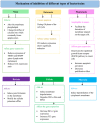Bacteriocins as Potential Therapeutic Approaches in the Treatment of Various Cancers: A Review of In Vitro Studies
- PMID: 36230679
- PMCID: PMC9563265
- DOI: 10.3390/cancers14194758
Bacteriocins as Potential Therapeutic Approaches in the Treatment of Various Cancers: A Review of In Vitro Studies
Abstract
Cancer is regarded as one of the most common and leading causes of death. Despite the availability of conventional treatments against cancer cells, current treatments are not the optimal treatment for cancer as they possess the possibility of causing various unwanted side effects to the body. As a result, this prompts a search for an alternative treatment without exhibiting any additional side effects. One of the promising novel therapeutic candidates against cancer is an antimicrobial peptide produced by bacteria called bacteriocin. It is a non-toxic peptide that is reported to exhibit potency against cancer cell lines. Experimental studies have outlined the therapeutic potential of bacteriocin against various cancer cell lines. In this review article, the paper focuses on the various bacteriocins and their cytotoxic effects, mode of action and efficacies as therapeutic agents against various cancer cell lines.
Keywords: anticancer; bacteriocin; cancer; lactic acid bacteria; new treatment.
Conflict of interest statement
The authors declare no conflict of interest.
Figures
References
-
- Ahmed N., Dawson M., Smith C., Wood E. Biology of Disease. Taylor & Francis Group; New York, NY, USA: 2017.
Publication types
Grants and funding
LinkOut - more resources
Full Text Sources
Other Literature Sources
Research Materials


